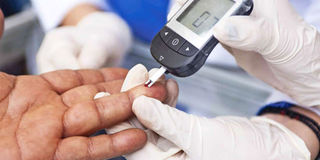Improved data collection key to diabetes war

Diabetes is one of the non-communicable diseases on the rise in sub-Sahara Africa with seven out of 10 adults having type 2 diabetes. PHOTO | FOTOSEARCH
Improved data collection procedures and timely publication of research results have been identified as a valuable weapon in the fight against diabetes.
Diabetes Prevention and Control Programme’s National Programme Officer at the ministry’s Division of Non-Communicable Diseases, Dr Zachary Muriuki, said there is need for better data collection and regular publications on the fight against diabetes.
Addressing those in attendance during the launch of the Africa Diabetes Pacesetters by pharmaceutical firm Novo Nordisk, Dr Muriuki asked doctors to document data collected in health facilities and share this with the national registry.
“We need to equip our national health data registry with all the findings from the healthcare facilities, so that we can intervene effectively and respond to the needs on the ground. We cannot do this alone. We need to work with all the clinicians who are the main interface with our patients,” he said.
Diabetes is one of the non-communicable diseases on the rise in sub-Sahara Africa with seven out of 10 adults having type 2 diabetes and lacking awareness or knowledge about their condition.
KIDNEY DAMAGE
The International Diabetes Federation estimates that more than 15.9 million people have diabetes and if this is not addressed soon, the figure is set to increase by 162 per cent by 2045.
World Health Organisation estimates the prevalence of diabetes in Kenya at 3.3 per cent and predicts a rise to 4.5 per cent by 2025. However, two-thirds of diabetics may be undiagnosed.
Unfortunately, there is scant recent data on the prevalence, morbidity and mortality of the lifestyle disease, which makes it difficult to measure its impact on the health sector and the economy.
One of the key drivers of the disease burden is delayed diabetes diagnosis that significantly increases the risk of complications such as kidney damage, heart disease, blindness, neural damage leading to amputations and an overall reduced life expectancy.
The Africa Diabetes Pacesetters initiative is aimed at building the capacity of healthcare providers involved in diabetes management and is set to run for the next three years. Its main areas of focus will be scientific communication, publications, and medical writing skills as well as the collection of real-world evidence in the country.



